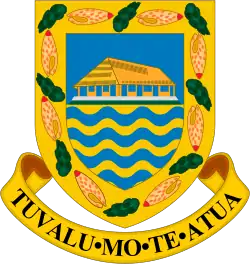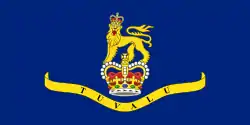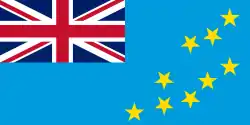Governor-General of Tuvalu
The Governor-General of Tuvalu is the representative of the Tuvaluan monarch (currently Queen Elizabeth II) and performs the duties of the Queen in her absence. The constitutional convention is that the Governor-General represents the monarch and acts on the advice of the prime minister.
| Governor-General of Tuvalu | |
|---|---|
 Coat of Arms of Tuvalu | |
 | |
| Viceroy | |
| Style | His/Her Excellency |
| Appointer | Monarch of Tuvalu |
| Term length | At Her Majesty's pleasure |
| Formation | 1 October 1978 |
| First holder | Sir Fiatau Penitala Teo |
| Salary | AU$ 23,768 annually[1] |
 |
|---|
| This article is part of a series on the politics and government of Tuvalu |
|
|
History
The office has existed since Tuvalu was granted independence from the United Kingdom on 1 October 1978.
The current incumbent is Her Excellency Mrs. Talesi Honolulu.[2]
Governors-General of Tuvalu
| No. | Name (Birth–Death) |
Term of office | Ref(s) | ||
|---|---|---|---|---|---|
| Took office | Left office | Time in office | |||
| 1 | Sir Fiatau Penitala Teo (1911–1998) |
1 October 1978 | 1 March 1986 | 7 years,
152 days |
[3] |
| 2 | Sir Tupua Leupena (1922–1996) |
1 March 1986 | 1 October 1990 | 4 years,
213 days |
[4] |
| 3 | Sir Toaripi Lauti (1928–2014) |
1 October 1990 | 1 December 1993 | 3 years,
60 days |
[4] |
| 4 | Sir Tomu Sione (1941–2016)1 |
1 December 1993 | 21 June 1994 | 202 days | [4] |
| 5 | Sir Tulaga Manuella (1936–) |
21 June 1994 | 26 June 1998 | 4 years,
5 days |
[4] |
| 6 | Sir Tomasi Puapua (1938–) |
26 June 1998 | 9 September 2003 | 5 years,
74 days |
[4] |
| 7 | Faimalaga Luka (1940–2005)2 |
9 September 2003 | 15 April 2005 | 1 year,
219 days |
[5] |
| 8 | Sir Filoimea Telito (1945–2011) |
15 April 2005 | 19 March 2010 | 4 years,
338 days |
[6] |
| –3 | Sir Kamuta Latasi (1936–) |
19 March 2010 | 16 April 2010 | 28 days | Acting. |
| 9 | Sir Iakoba Italeli | 16 April 2010 | 22 August 2019 | 9 years,
127 days |
[7] |
|
–4 |
Mrs. Teniku Talesi Honolulu | 22 August 2019 | Incumbent | 1 year, 171 days | Acting. |
- Notes
- ^ Sione stood for parliament after leaving his post.
- ^ The only governor-general not to accept a knighthood.
- ^ Latasi served as acting governor-general.
- ^ Sir Iakoba Taeia Italeli resigned to contest in the 2019 general election.[8] The decision of the caretaker government of Enele Sopoaga was to appoint the next Governor-General from the island of Nanumaga, which the new government of Kausea Natano accepted, however the appointment was held up as the government did not accept the way or the process by which the nomination was carried out by the Nanumaga Falekaupule.[8]
Constitutional status of the Governor-General
The Monarchy of Tuvalu exists in a framework of a parliamentary representative democracy. As a constitutional monarch, The Queen acts entirely on the advice of her government ministers in Tuvalu.[9] The Head of State is recognised in section 50 of the Constitution of Tuvalu, as a symbol of the unity and identity of Tuvalu. The powers of the head of state are set out in section 52 (1) of the Constitution.[10][11]
Part IV of the Constitution confirms the head of state of Tuvalu is Queen Elizabeth II as the sovereign of Tuvalu and provides for the rules for succession to the Crown. As set out in section 54 of the Constitution, the Queen’s representative is the governor-general. Section 58 of the Constitution requires the governor-general to perform the functions of the head of state when the sovereign is outside Tuvalu or otherwise incapacitated. The governor-general of Tuvalu is appointed by the monarch upon the advice of the Prime Minister of Tuvalu.
Reserve powers of the office
The position is largely ceremonial. However the holder has constitutional responsibilities and reserve powers in relation to the ordering the Parliament of Tuvalu to convene and the appointment and dismissal of the prime minister.[10][12]
In 2003 the Chief Justice of the High Court of Tuvalu delivered directions as to how the Governor-General should proceed to take any action he considers to be appropriate under Section 116(1) of the Constitution, acting in his own deliberate judgment, rather than as advised by the cabinet.[13] That is, the Governor-General could consider whether it was appropriate to exercise his reserve powers in calling Parliament.
The then Governor-General, Sir Iakoba Italeli was called on to exercise the reserve powers when prime minister Willy Telavi refused to recall parliament after the 2013 Nukufetau by-election. A constitutional crisis developed when Prime Minister Telavi responded that, under the Constitution, he was only required to convene parliament once a year, and was thus under no obligation to summon it until December 2013.[14] Tuvalu's opposition then requested the governor-general to intervene against the prime minister's decision.[15] On 3 July, Italeli exercised his reserve powers in ordering parliament to convene, against the prime minister's wishes, on 30 July.[16]
When the Parliament met on 30 July, the Speaker (Sir Kamuta Latasi) refused to allow a debate on a motion of no confidence in the government of Willy Telavi. After further political maneuvers,[17] the then Governor-General, Sir Iakoba Italeli, then proceeded to exercise his reserve powers to order Telavi to stand down as prime minister and appointed Enele Sopoaga as interim prime minister.[18] The governor-general also ordered that parliament sit on Friday 2 August to allow a vote of no-confidence in Telavi and his government.[19] Telavi then proceeded to write to Queen Elizabeth II (as the head of state of Tuvalu) informing her that he was dismissing Italeli from his position as Governor-General.[18] Her Majesty made no reaction at all, thus leaving Sir Iakoba secure in his post.
The constitutional crisis was resolved by a motion of no confidence in the government of Willy Tevali, which was held on 2 August 2013: the voting was eight for the motion, four against and one abstention.[20] On 4 August the parliament elected Enele Sopoaga as prime minister.[20][21][22]
Civil awards and decorations
Tuvalu awards orders of chivalry for distinguished service to the government, the community, society or humanity, which are orders of the British honours system. Governor-Generals have been awarded the Order of St Michael and St George. Former Governor-General Faimalaga Luka had thus far been the only holder of this office to decline a knighthood.
Other Tuvaluans have been awarded the Order of the British Empire.
The Tuvalu Order of Merit[23] was founded on 1 October 2016, on the 38th anniversary of Tuvaluan independence.[24]
References
- Tuvalu. "PRESCRIPTION OF SALARIES ACT, 2008 Revised Edition" (PDF). tuvalu-legislation.tv.
- "United Nations - Heads Of State" (PDF). United Nations - Protocol and Liaison Service. 2020. Retrieved 10 January 2021.
- Brij V. Lal, Kate Fortune (2000). The Pacific Islands: An Encyclopedia. University of Hawaii Press. p. 282.
- Craig, Robert D. (2010). Historical Dictionary of Polynesia. Scarecrow Press.
- Lansford, Tom (2015). Political Handbook of the World 2015. CQ Press.
- "State Funeral of the late former Governor General of Tuvalu, Reverend Sir Filoimea Telito, GCMG, MBE" (PDF). Tuvalu Philatelic Bureau Newsletter (TPB: 01/2011). 25 July 2011. Retrieved 20 November 2012.
- "HE Sir Iakoba Taeia Italeli, GCMG". Archived from the original on 7 April 2014. Retrieved 7 December 2012.
- "GG's Appointment: Nanumaga Continues To Defy Government's Request". Kitiona Tausi, Tuvalu Paradise - Issue No. 44/2020. 9 October 2020. Retrieved 4 January 2021.
- "The Queen's Role in Tuvalu". Official website of the British Monarchy. Retrieved 4 April 2014.
- "The Constitution of Tuvalu". PACLII. Retrieved 10 March 2014.
- "The Constitution of Tuvalu". Tuvalu Islands. Retrieved 10 March 2014.
- "Tuvalu Islands". The Constitution of Tuvalu. Retrieved 10 March 2013.
- "Amasone v Attorney General [2003] TVHC 4; Case No 24 of 2003 (6 August 2003)". PACLII. Retrieved 5 April 2015.
- "Parliament needs one yearly meeting only says defiant Tuvalu PM". Radio New Zealand International. 2 July 2013. Retrieved 14 September 2014.
- Coutts, Geraldine (2 July 2013). "Tuvalu opposition demands parliament be allowed to sit after weekend by-election". Radio Australia. Retrieved 19 July 2013.
- Matau, Robert (3 July 2013). "Tuvalu's parliament convenes July 30". Islands Business. Archived from the original on 21 September 2013. Retrieved 5 August 2013.
- Matau, Robert (5 August 2013). "Tuvalu govt bombshells". Islands Business. Archived from the original on 29 April 2014. Retrieved 5 August 2013.
- AFP (2 August 2013). "Dismissal crisis rocks Tuvalu". Sydney Morning Herald. Retrieved 5 August 2013.
- Cooney, Campbell (1 August 2013). "Tuvalu government faces constitutional crisis". Australia News Network. Retrieved 5 August 2013.
- Cooney, Campbell (4 August 2013). "Tuvalu parliament elects new prime minister". Australia News Network. Retrieved 5 August 2013.
- Cooney, Campbell (5 August 2013). "Sopoaga elected new PM in Tuvalu". Radio Australia. Retrieved 5 August 2013.
- "Enele Sopoaga Sworn-in Today as Tuvalu's New PM". Islands Business. 5 August 2013. Archived from the original on 21 September 2013. Retrieved 5 August 2013.
- Palmer, Richard (30 March 2017). "William and Kate to receive highest Tuvalu award... for just VISITING the nation". Express. Archived from the original on 12 April 2017. Retrieved 12 April 2017.
- "Government of Tuvalu 2017 National Budget" (PDF). Presented by the Hon Maatia Toafa Minister for Finance and Economic Development. 30 November 2016. Retrieved 26 August 2018.
